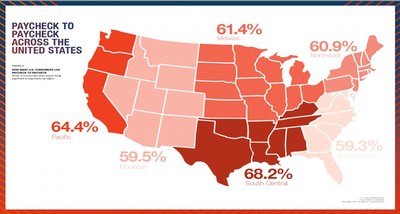Half the Share of the Wealthiest Americans Now Live Paycheck to Paycheck
According to LendingClub's recent study, 50% of Americans earning over $100,000 annually now live paycheck to paycheck, a rise from 48% in January. Additionally, 67% of urban residents are also in this situation. The report highlights a troubling trend where even wealthier individuals face financial strain due to rising inflation. The study, conducted from February 7 to 14, 2022, surveyed 3,250 U.S. consumers, revealing that 80% of those making less than $50,000 live paycheck to paycheck. LendingClub advocates for better cash flow management to combat these challenges.
- LendingClub's research provides critical insights into consumer financial behaviors, helping identify market needs.
- The increased awareness about cash flow management can enhance customer engagement with LendingClub's services.
- Growing number of high-income consumers living paycheck to paycheck raises concerns about the overall economic health.
- Inflation continues to impact consumer spending, potentially leading to further financial distress.
Insights
Analyzing...
SAN FRANCISCO, April 4, 2022 /PRNewswire/ -- LendingClub Corporation (NYSE: LC), the parent company of LendingClub Bank, America's leading digital marketplace bank, today released findings from the eighth edition of the Reality Check: Paycheck-To-Paycheck research series, conducted in partnership with PYMNTS.com.
The Regional Divide Edition examines the growing shares of consumers living paycheck to paycheck in urban, suburban, and rural areas of the U.S. and the impact on their ability to both build savings and afford emergency expenses.
Key takeaway: Exactly half the share of the wealthiest Americans now live paycheck to paycheck. The number of Americans earning more than
Living paycheck to paycheck means devoting all of one's salary to expenses with little to nothing left over at the end of the month. Many paycheck-to-paycheck consumers are able to remain credit-worthy by actively managing their cash flows in real time; however, breaking the cycle of debt remains elusive. LendingClub helps this growing population of consumers looking to get a handle on their finances by simplifying the everyday financial experience.
"With inflation hitting even the wealthiest Americans' pocketbooks, the ranks of paycheck-to-paycheck Americans continues to swell," said Anuj Nayar, LendingClub's financial health officer. "It's time to take a long, hard look at ways to trim down unnecessary expenses. One of the first things you can do is pay less on any expensive credit card bills by converting them into an installment loan with a fixed rate and clear end date."
In addition to the share of paycheck-to-paycheck consumers earning more than
Paycheck-to-paycheck consumers fall into two categories: those who can pay their bills easily and those who cannot. PYMNTS' research finds that in February 41 percent of consumers were living paycheck to paycheck without difficulties paying monthly bills, while 21 percent were living paycheck to paycheck with difficulties paying their monthly bills. In February, 38 percent of consumers were not living paycheck to paycheck, up from 36 percent in January.
Consumers in urban areas are both more likely to earn more than
Urban consumers report the highest savings (
"Whether you are living in a city, a suburb or a rural community, inflation is a fact of life," added Nayar, "As the effects of the most recent hikes in gas and grocery prices continue to be felt by all Americans, it's time for consumers in all income brackets and geographies to review their financial situations and look for better ways to manage their cash flow."
New Reality Check: The Paycheck-To-Paycheck Report is based on a census-balanced survey of 3,250 U.S. consumers conducted from Feb. 7 to Feb. 14, 2022. The Paycheck-To-Paycheck series expands on existing data published by agencies such as the Federal Reserve System and the Bureau of Labor Statistics to provide a deep dive into the elements that lie at the backbone of the American consumer's financial wellness: income, savings, debt and spending choices. The report's sample was balanced to match the U.S. adult population in a set of key demographic variables:
LendingClub Corporation (NYSE: LC) is the parent company of LendingClub Bank, National Association, Member FDIC. LendingClub Bank is the leading digital marketplace bank in the U.S., where members can access a broad range of financial products and services designed to help them pay less when borrowing and earn more when saving. Based on more than 150 billion cells of data and over
CONTACT:
For Investors: IR@lendingclub.com
Media Contact: Press@lendingclub.com
![]() View original content to download multimedia:https://www.prnewswire.com/news-releases/half-the-share-of-the-wealthiest-americans-now-live-paycheck-to-paycheck-301516467.html
View original content to download multimedia:https://www.prnewswire.com/news-releases/half-the-share-of-the-wealthiest-americans-now-live-paycheck-to-paycheck-301516467.html
SOURCE LendingClub Corporation








